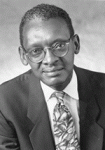By William Reed
Among Donald Sterling’s rants he said something more Blacks need to recognize as truth. Sterling’s comments that: “When Jews get successful they will help their people. And some of the African-Americans … they don’t want to help anybody” were neither unfair nor racist. Start with his point: the majority of Blacks don’t help other Blacks. It is a reality that most honest Blacks will admit is true. And it’s something that our community has grappled with for years. If you just focus on the messenger instead of the message you will miss the truth that in our culture Blacks have a history of not supporting one another. Look at Blacks’ economics versus those of Jews. Of all groups’ “collective capitalism” practices Jews are among the best, while Blacks are the worst. Research data shows: a dollar circulates up to 12 times within Jewish circles, but is in and out of the Black community within 12 hours.
Where do Blacks Americans go from here? Blacks’ economic status is a reflection of our counter-capitalistic actions. Since the 1960s, Blacks have been on “a mission” to associate and acculturate with White society. All that assimilated was our money.
Blacks need to help each other out of the bottom of the barrel. Isn’t it about time for Blacks to become more “preoccupied” with putting “race issues” in our personal practices and patterns? Too often Blacks compete against each other. To be competitive in American politics and capitalism, Black Americans have to rid themselves of the “crabs-in-a-barrel syndrome” and start prioritizing race-based issues and practices.
We need to drop the “mainstream” stint to do things among African Americans that build wealth through ownership and development of businesses. This way of thinking and acting is an offshoot of Black Nationalism. It’s time greater numbers of us become Black Capitalists in the mode of Booker T. Washington and Robert Reed Church, who founded the nation’s first Black-owned bank in 1906, Solvent Savings.
Where do you think Sterling buys his food, clothes or banks? When did you last purchase something from a minority vendor? How often do you pass a minority-owned restaurant on your way to eat at “a name brand” dining establishment?
How do you identify? Are you Black first and American second? This is a difficult question for Blacks with a “mainstream orientation” to answer, but probably isn’t for Jewish, Asian or immigrant groups. Many of us desire to be American, Democrat, Republican, Conservative or Liberal before being “Black.”
Being “Black first” requires dedication to a political ideology that focuses on Blacks’ interest. The principle objectives of Black nationalists are unity and self-determination – independent from European society. Martin Delany, an African-American abolitionist, in the 1800s, is considered the foremost Black nationalist of his day.
The origins of Black Nationalism lie in the political thought of people like Marcus Garvey, Martin Delany, Henry Highland Garnet, Edward Wilmot Blyden and Paul Cuffe among others. Garvey’s Universal Negro Improvement Association of the 1910s and 1920s proved to be the most powerful Black Nationalist movement to date that boasted 11 million members. Black Nationalist philosophy began when the Africans were brought ashore to the Americas. After the Revolutionary War, personalities such as Prince Hall, Richard Allen, and Absalom Jones started important organizations such as the Free African Society, African Masonic lodges and church institutions. Modern Black Nationalism stresses building separate communities that promote racial pride and collective resources. This helped to create groups like the Moorish Science Temple and Nation of Islam.
Blacks need leadership that embraces race as a critical component of their professional identity. Increasing numbers of Blacks recognize business as the preferred vehicle to financial freedom and view the private sector, rather than the public one, as the nexus of American power. Like the Jews, Blacks need strong principles of collective economic concepts to succeed in America. More Blacks should support each another, instead of denigrating one another. It’s that simple.
William Reed is publisher of “Who’s Who in Black Corporate America” and available for projects via the BaileyGroup.org.



















I salute this educational insight.
Great article Mr. Reed. Sadly, it is so true.
Sincerely; Stephen Wiggins Sent from my Galaxy S®III